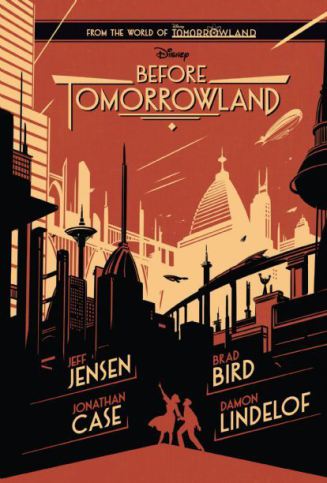
Movie studios commonly release companion books that fill in gaps left open by their films. It’s a smart business decision, but many offer little beyond a few interesting tidbits. If any release deserved extra material, it was Tomorrowland. The 130-minute running time only allowed us to understand the basics of Plus Ultra. Director and co-writer Brad Bird used a relentless pace that challenged us to keep up with him.
Sadly, that complexity may have contributed to the box-office failure. People who entered the story cold might feel lost. Bird and co-writer Damon Lindelof didn’t want to bog us down with exposition, but the opposite move created different challenges.
As a Disney and EPCOT fan, I enjoyed Tomorrowland and its optimistic take on the potential for our future. While some found the message preachy, it spoke to me. After seeing the movie, I wanted to learn more about this fictional world. This makes the existence of the prequel Before Tomorrowland such a treat.
Written by Jeff Jensen and Jonathan Case, the Disney Press book takes us back to 1939 and the early days of Plus Ultra. Frank Walker, Casey Newton, and Athena are nowhere; this is a different tale. Its setting is the pulp world of evil Nazis, notorious figures like Howard Hughes and Amelia Earhart, and a dangerous battle to save their future. It’s a YA-style novel of cliffhangers and daring escapes that’s an easy read.
Expanding the World of Tomorrowland
I don’t want to oversell this book, however. It’s important to approach the content like a DVD bonus feature. The characters are mostly likable, particularly Earhart and the innocents Clara and Lee. The mother-and-son duo feels like real people instead of one-note enemies like scientist Dr. Rotwang and his Nazi overload Lohman.
There’s also the misunderstood Henry, a human boy trapped in the body of a robot. He’s the ultimate prize that holds the key to the potential destruction of Tomorrowland. Hanging over everything is the impending public reveal of Plus Ultra and this new dimension in 1939. Anyone who’s seen the movie must expect that the plan will unravel.
Supplemented nicely by Case’s art, Before Tomorrowland has the right look for its movie-serial atmosphere. That framework drew me into the story, despite minor reservations. I can’t dislike a book that reveals plans for its hidden city through comic books, secret glasses, and Orson Welles.
A cavalcade of historical figures adds to the fun and creates a fun alternative look at our past. Albert Einstein, H.G. Wells, Nikola Tesla, and others make an impression as figures trying to save the world. I like the idea of great thinkers trying to build a city of the future. Technology has outpaced their ability to control it, and the concern of destroying Earth while trying to save it hangs over everything.
Surrounding the story are events like the 1939 New York World’s Fair and the first Worldcon sci-fi convention, but they are mostly just a historical backdrop. The threat of Hitler and the Nazis is ever-present, but this isn’t a tragedy. Not everything works in Plus Ultra’s favor, but we know from the movie that Tomorrowland will happen.
The Potential for Something Greater
This book’s events set the stage for its construction (especially in the epilogue) and should be fun if you enjoyed the film. A bonus comic shows the pitch that Plus Ultra planned to make in the late ‘30s. After the Depression and multiple wars, we needed a new start in a world where anything was possible. We may not be in that same boat today, but part of me wishes for it anyway.
Here are some other interesting aspects of this book:
- There are limited Walt Disney references in Before Tomorrowland given its 1939 setting. However, there are quick mentions of early films like Steamboat Willie and Snow White and the Seven Dwarfs in its pages. Also, phrases like “The world of today is pointing you toward the world of tomorrow” fall into the Disney realm of retro-futurism.
- The brief appearances by Howard Hughes are fun and don’t transform him into a misunderstood saint. He’s still an eccentric guy more focused on the capitalist side of Plus Ultra.
- The Faustus robots are cool precursors to the audio-animatronics like Athena in Tomorrowland. They’re still a work in progress but are following a similar mission of recruiting special people.
- The chapter intros also contribute to the pulpy feeling with such phrases as “In which a comic book is read and geeks fight.” The authors aren’t taking this material too seriously.
Related Articles
Tomorrowland: Optimism and the Disney Parks
16 All-Time Tomorrowland Attractions Ranked
This post contains affiliate links. Making any purchase through those links supports this site. See full disclosure.



Leave a Reply